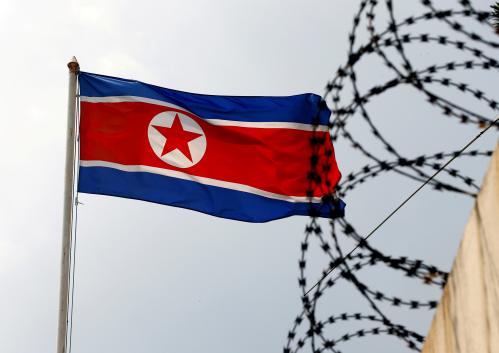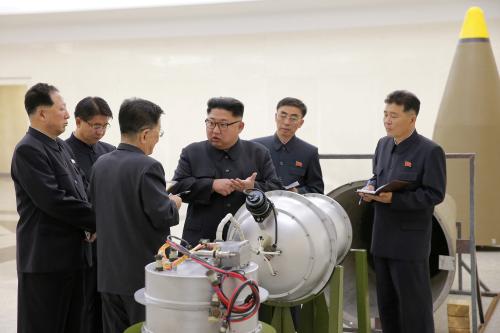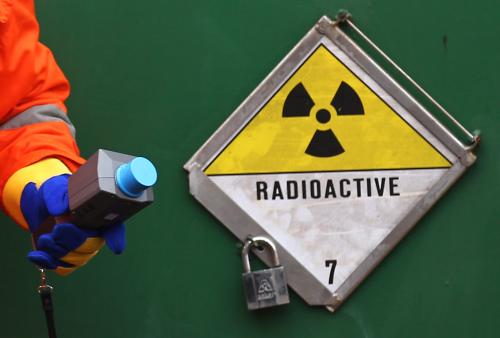How to handle yet another North Korean nuclear weapons test? Michael O’Hanlon argues that we need a policy that is both more pragmatic, in terms of its immediate goals for changing North Korea’s behavior, and more promising in its ability to gain greater Chinese cooperation for squeezing North Korea if there are further unacceptable actions taken in the future. This piece was originally published in USA Today.
How to handle yet another North Korean nuclear weapons test, the second this year and fifth overall? President Obama’s approach, consistent with his “no drama Obama” nickname, has been to reduce the visibility of the issue and avoid rewarding Pyongyang with lots of attention and offers of better relations—trying instead to persuade China, North Korea’s only ally and most important economic partner, to tighten sanctions. This approach is not working very well.
To be sure, some added sanctions—and better sanctions enforcement—should, as always, be the first step here. That said, we can already predict what Beijing is most likely to do, based on history. Some moderate toughening of formal sanctions will happen, but many Chinese firms will avoid tough enforcement and the net effect will be very modest. As recent research by John Park and others at Harvard has shown, this has been the norm for years.
But we also need to recognize reality: North Korea continues to test nuclear weapons—no other country has done so this century—and it may well keep it up. Even worse, as best we can tell, it continues to produce more fissile materials and thus quite likely more bombs. It remains demonstrably unfazed by Western sanctions and unafraid of Chinese retaliation. Perhaps North Korea will decide this latest test was successful enough that it should stop. But that may be wishful thinking, too.
We need a policy that is both more pragmatic, in terms of its immediate goals for changing North Korea’s behavior, and more promising in its ability to gain greater Chinese cooperation for squeezing North Korea if there are further unacceptable actions taken in the future.
How to do this? The United States and other countries should keep its same goal of North Korean denuclearization, the complete and verifiable elimination of its existing arsenal of perhaps 10 to 12 bombs (maybe more), as the only way for Pyongyang to gain a lifting of sanctions and greater economic aid in the future. But we also need a shorter-term and more pragmatic approach that would seek to freeze North Korea’s progress. A new president could pursue this come January, after President Obama presumably first makes the effort to tighten sanctions as a necessary if unpromising first American and international response.
We cannot reward North Korea for its outlandish actions, or “buy the same horse twice” to quote those U.S. officials who argued in the past that North Korea violated previous denuclearization deals and then returned to the negotiating table, only to demand additional compensation. But we can offer incentives for North Korea to take certain actions that it has not yet been asked to undertake, along with restraint on the nuclear front, as part of a package deal.
The interim goal of this policy to dissuade Pyongyang from any more nuclear testing and to persuade it to dismantle, verifiably, its nuclear infrastructure—the reactor that produces plutonium and the centrifuges that produce enriched uranium. We know where the former is. We do not know where the latter is located, so some form of managed access would be needed to identify and visit these sites (perhaps involving Chinese, Russian or UN monitors, if American eyes are unwelcome).
The incentives that Washington and key regional states could offer in the short term would be a gradual relaxation of many existing sanctions on North Korea, in return not only for the near-term nuclear restraint noted above, but for an end to the production and testing of ballistic missiles above a certain range, and a pullback of some potent weaponry from near the DMZ.
Over the longer term, the deal could aim for denuclearization and a fuller normalization of relations. If North Korea also agreed to steps to scale back its conventional forces substantially and to gradually reform its economy (à la Vietnam), the international community could offer more humanitarian and development aid, along with full diplomatic ties. Complete denuclearization would be part and parcel of such an agreement. Of course, achieving or even negotiating such a plan is not realistic in the short term. But we can lay out the vision while working with the North on the shorter-term package of sanctions relief in exchange for verifiable nuclear restraint, stringent limits on ballistic missile testing and production and conventional force pullbacks.
Even if this plan wouldn’t fundamentally solve the problem of North Korea’s nukes, there is a huge difference between freezing North Korea’s nuclear capabilities where they are now, on the one hand, and seeing them continue to advance qualitatively and quantitatively on the other. Moreover, laying out such a vision for disarmament, even if unsuccessful, would be consistent with Chinese views on the issue. By promoting it, we would have established a context for asking Beijing for tougher measures next time North Korea misbehaves, should that again occur. Whether the policy achieves its preferred goal or not, it is likely to work better than the course we are now on.







Commentary
Time to rethink after new North Korean nuke test
September 10, 2016